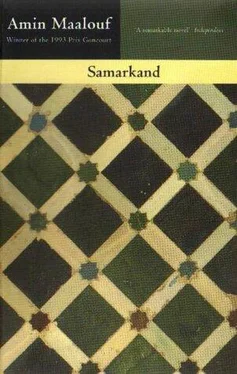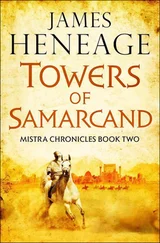The next day thirty other merchants came in the same way to profit from the right of asylum. Three days later, on 23 July, there were eight hundred and sixty. By 26 July there were five thousand — and twelve thousand by 1 August.
This Persian town planted in an English garden was a strange sight. There were tents all around, clustered together by guild. Life there had been speedily organized with a kitchen being set up behind the guards pavilion from which enormous cauldrons were sent around to the different ‘districts’, each sitting lasting three hours.
There was no disorder and very little noise. Taking refuge, or taking bast as the Persians say, means giving oneself over to a strictly passive resistance in the shelter of a sanctuary of which there were several in the area of Teheran: the mausoleum of Shah Adbul-Azim, the royal stables, and the smallest bast of all, the wheeled cannon in Topkhane Square — if a fugitive clung to it, the forces of order no longer had any right to lay hands on him. However, Jamaladin’s experience had shown that the powers that be would not tolerate this form of protest for long. The only immunity that they recognised was that of the foreign legations.
To the English, every refugee had brought his kalyan and his dreams. From tent to tent there was a world of difference. Around Fazel was the modernist elite; they were not just a handful but hundreds of young and old men, organized into anjuman — which were more or less secret societies. Their debates raged ceaselessly around the topics of Japan, Russia and particularly France whose language they spoke and whose books and newspapers they assiduously read — the France of Saint-Simon, Robespierre, Rousseau and Waldeck-Rousseau. Fazel had carefully cut out the section of the law on the separation of church and state which had been voted on a year earlier in Paris. He had translated it and handed it out to his friends and they were now debating it heatedly albeit in hushed tones, for not far from their circle there was a gathering of mullahs.
The clergy itself was divided. One party rejected everything which came from Europe including the very idea of democracy, parliament and modernity. ‘How,’ they said, ‘could we need a constitution when we have the Quran?’ To which the modernists replied that the Book had left to men the task of governing themselves democratically since it declared, ‘Let your affairs be a matter of mutual consent.’ Cunningly they added that if, upon the death of the Prophet, the Muslims had a constitution organizing the institutions of their embryonic state, they would not have seen the bloody struggles for succession which led to the ousting of the Imam Ali.
Beyond the debate on doctrine, the majority of the mullahs nevertheless accepted the idea of a constitution to put an end to the arbitrary nature of royal rule. Having come in their hundreds to take bast , they delighted in comparing their act to the Prophet’s migration to Medina and the sufferings of the people to those of Hussein, the son of Imam Ali, whose passion is the closest Muslim equivalent to that of Christ. In the legation’s gardens, professional mourners, the rozeh-khwan , recounted to their audience the sufferings of Hussein. People cried, flagellated themselves, and grieved unrestrainedly for Hussein, for themselves and for a Persia which was astray in a hostile world and had sunk over the centuries into unending decadence.
Fazel’s friends distanced themselves from these displays. Jamaladin had taught them to feel disdain for the rozeh-khwan. They could only listen to them with worried condescension.
I was struck by a cold reflection written by Shireen in one of her letters. ‘Persia is ill,’ she wrote. ‘There are several doctors at her bedside, some modern and some traditional and each one offers his own remedies. The future belongs to him who can effect a cure. If this revolution triumphs, the mullahs will have to turn themselves into democrats; if it fails, the democrats will have to turn themselves into mullahs.’
For the moment they were all in the same trench, in the same garden. On 7 August, the legation counted sixteen thousand bastis , the streets of the city were empty and any merchant of renown had ‘emigrated’. The Shah had to give in. On 15 August, less than a month from the start of the bast , he announced that elections would be organized to elect a national consultative assembly by direct suffrage in Teheran and indirect suffrage in the provinces.
The first parliament in the history of Persia met on 7 October. To read out the Shah’s speech, he judiciously sent a veteran opponent, Prince Malkom Khan, an Armenian from Isfahan and a companion of Jamaladin, the very same man who had put him up during his stay in London. He was a magnificent old man in the British mould who had dreamt throughout his whole life of standing in front of Parliament as he read out the speech of a constitutional sovereign to the representatives of the people.
Those who wish to examine this page of history more closely should not look for the name of Malkom Khan in documents of the time. Today, as in the time of Khayyam, Persia does not remember its leaders by their names, but by their titles, such as ‘Sun of the Kingdom’, ‘Pillar of the Religion’ or ‘Shadow of the Sultan’. To the man who had the honour of inaugurating the era of democracy the most prestigious title of all was given: Nizam al-Mulk. Disconcerting Persia, so immutable in its convulsions but how unchanged after so many metamorphoses!
It was a privilege to be present at the awakening of the Orient. It was a moment of intense emotion, enthusiasm and doubt. What ideas, both brilliant and monstrous, had been able to sprout in its sleeping brain? What would it do as it woke up? Was it going to pounce blindly upon those who had shaken it? I was receiving letters from readers with anguished requests that I look into the future. They still remembered the Boxer Revolt in Peking in 1900, the foreign diplomats who were taken hostage, the troubles the expeditionary force came up against with the old Empress, the fearsome Daughter of Heaven, and they were afraid of Asia. Would Persia be any different? I replied with a definite ‘yes’, putting my trust in the emerging democracy. A constitution had just been promulgated in fact, as well as a charter of rights for the citizens. Clubs were coming into being every day, as well as newspapers — ninety dailies and weeklies in the space of a few months. They were entitled Civilization, Equality, Liberty , or more pompously Trumpets of the Resurrection. They were frequently quoted in the British press or the opposition Russian newspapers such as the liberal Ryesh and Sovremenny Mir which was close to the social democrats. A satirical newspaper met with overwhelming success from its very first issue. Its cartoonists’ favourite targets were the shady courtiers, agents of the Tsar and, above all, the false zealots.
Shireen was jubilant: ‘Last Friday,’ she wrote, ‘some young mullahs tried to raise a mob in the bazaar. They called the constitution a heretical innovation and tried to incite the crowd to march on Baharistan, the seat of the Parliament — but without success. They shouted themselves hoarse, but to no avail since the townspeople remained indifferent. From time to time a man would stop, listen to the end of some piece of invective and then walk off shrugging his shoulders. Finally three of the city’s most respected ulema arrived and with no further ado invited the preachers to go home by the shortest route and to keep their eyes cast below knee level. I can hardly believe it — fanaticism is dead in Persia.’
Читать дальше












